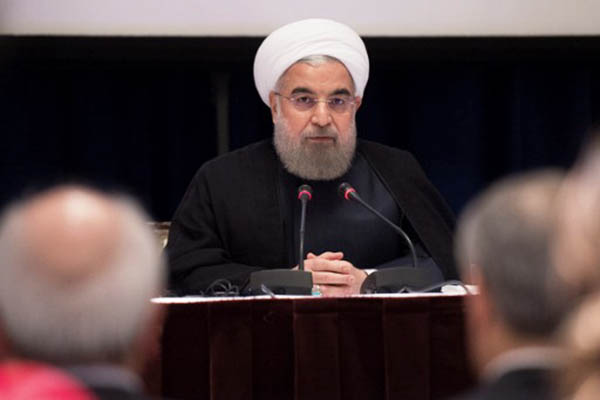
Don Emmert—AFP
Iranian president says Washington is failing to live up its commitments under last year’s nuclear deal.
Iran used the U.N. General Assembly on Thursday to accuse the United States of failing to implement aspects of the historic nuclear deal, demanding that Washington do so or risk formal complaint.
President Hassan Rouhani complained that America is dragging its feet on its side of the bargain, and elaborated on his complaints at a follow-up news conference with reporters. “The lack of compliance with the JCPOA on the part of the United States in the past several months represents a flawed approach that should be rectified forthwith,” Rouhani told the world body, referring to the deal.
The agreement between Tehran, Washington and five other major powers came into force in January. Iran accepted curbs to its nuclear program in exchange for their lifting sanctions.
While observers say Iran has met its commitments, Tehran accuses Washington of continuing to block the Islamic republic from the international banking system, limiting its ability to benefit from the end of sanctions.
Iran says the agreement has already led to a significant rise in oil exports, but that in other sectors international banks are concerned they will be liable for prosecution by the U.S. Treasury if they do business with Iran.
“They scare, they frighten the big banks with the threat of potential action by the United States Treasury. This is something that we oppose,” Rouhani told a news conference following his address.
Rouhani told reporters that the United States was guilty of delays, a “complete lack of transparency” and failure to take action on commitments. He complained of a “severe delay” over the sale of passenger jets for example, accusing the United States of failing to prepare the requisite paperwork between signing the agreement in July 2015 and the accord coming into effect.
“There would have been ample time within that window to take all the necessary actions for the subsequent steps,” he told reporters.
The United States is the only problem, he said. “Other nations are working hard to realize their commitments,” he told reporters.
The Iranian president welcomed the prospect of U.S. companies doing business in Iran. “If we have issues, those are with the United States government, not with the companies, not with private enterprise,” he said.
Tehran has threatened to take action in the International Court of Justice against the United States if $2 billion in frozen assets belonging to its central bank is diverted to American victims of terror attacks. “We see this as an international heist to be quite frank,” Rouhani told reporters. “I am certain that we will be legally victorious and the United States will be fined for this transgression,” he added.
But he also gave a staunch defense of the nuclear deal as in the best interests of Iran, its economy and its people, saying that trade with the European Union was up more than 44 percent already this month. “The question then becomes what will we do if the United States continues non-adherence,” he said, referring to complaint mechanisms built into the deal. “A complaint would be brought to this joint commission and the ministers of foreign affairs from seven countries would talk,” he said.
Asked about November’s U.S. presidential election, with Democrat Hillary Clinton competing against Republican Donald Trump, Rouhani said it made no difference to Iran who won as long as the incoming U.S. administration respected Iran and decreased tension. “If the objective becomes to increase tensions or disrespect the dignity of the Iranian nation, the response is going to be different,” he said. He called for the Iranian nuclear deal to be safeguarded and nurtured, saying it was “so vital, not just to our two countries but to the region and the world.”
The nuclear agreement has faced opposition from ultra-conservatives in Iran and the United States, led by Republican opponents of Democratic President Barack Obama’s administration.
